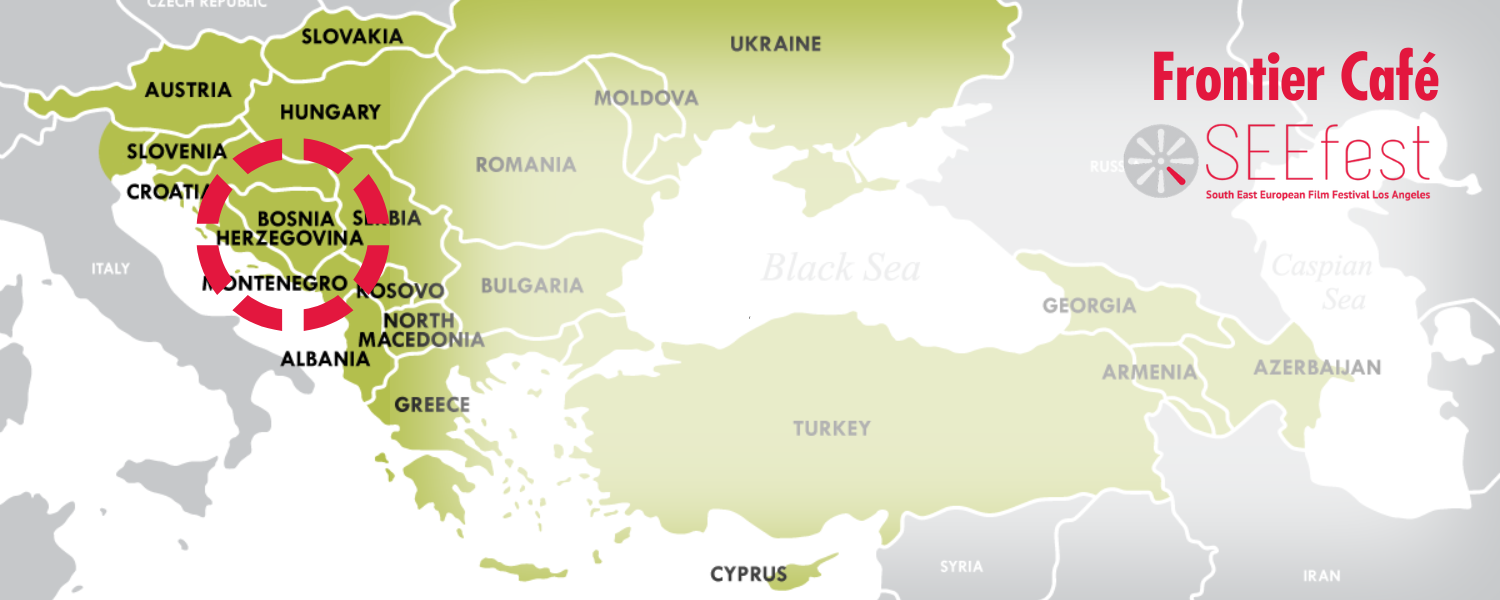The Frontier Café – Conversation with George Csicsery

“Bringing mathematics to nonmathematical audiences.”
Please subscribe to our new podcast. Available on Anchor, Spotify, Amazon Music, Google Podcast, Castbox, Pocket Cast, Radio Public, YouTube

In this episode of the Frontier Café, Michael Pardy hosts a discussion with SEEFest Jury alum, writer, and prolific filmmaker George Csicsery. Csicsery and his production company, Zala Films are based in Oakland, California.
In this wide-ranging discussion, George talks about his journey from an undergrad majoring in comparative religion to his life’s work as a journalist and filmmaker and the inherent challenges and rewards in making and financing his films. He also discusses some of his latest projects, including the remarkably poignant Secrets of the Surface: The Mathematical Vision of Maryam Mirzakhani (2020) and his still-in-production, Journeys of Black Mathematicians.
About the Guest
GEORGE PAUL CSICSERY, a writer and independent filmmaker, has produced 35 documentaries on historical, ethnographic, and cultural subjects, including “Where the Heart Roams” (1987), “Hungry for Monsters” (2003), “Troop 214” (2008). “The Thursday Club” (2005), and “Songs Along A Stony Road” (2011).
He is best known for his films on mathematical topics, including N is a Number: A Portrait of Paul Erdős (1993), Julia Robinson and Hilbert’s Tenth Problem, (2008), Hard Problems: The Road to the World’s Toughest Math Contest (2008), Taking the Long View: The Life of Shiing-shen Chern (2011), Counting from Infinity (2015), Navajo Math Circles (2016), and Secrets of the Surface: The Mathematical Vision of Maryam Mirzakhani (2020). In 2009 he received the Joint Policy Board for Mathematics (JPBM) Communications Award for “bringing mathematics to nonmathematical audiences.” In 2017-2019 he was Presidential Fellow at Chapman University.
See www.zalafilms.com for more.
Connect with George Csicery on Social Media
Facebook | Instagram | Twitter
SUPPORT SEEFEST
Not a member yet? Become an art patron with other SEEfest arthouse aficionados in support of great events and programs, as well as our mission to keep you informed about initiatives from our wide network of fellow cultural organizations.
We Welcome YOU!
The Frontier Café – Conversation with Dr. Ali İğmen





The history and future of Balkan Cinema
Please subscribe to our new podcast. Available on Anchor, Spotify, Amazon Music, Google Podcast, Castbox, Pocket Cast, Radio Public, YouTube


On this episode of Frontier Cafe, host Milan Zivkovic chatted with Dr. Ali İğmen, one of his favorite History professors at California State University at Long Beach (CSULB). The conversation touched on representation in film, cinema as ideology, and current films that caught our attention (for better or worse). Please enjoy the discussion merging historical perspectives with film!
About the Guest
Dr. Ali İğmen s a Professor of Central Asian History and the Director of the Oral History Program at California State University, Long Beach (CSULB). His book, Speaking Soviet with an Accent: Culture and Power in Kyrgyzstan, was published by the “Central Asia in Context Series” of the University of Pittsburgh Press in July 2012 and was a finalist for the best book award of the Central Eurasian Studies Society.
His most recent article, “Intimate Publics, Looking Back and Looking Abroad,” will appear in the collected volume Tulips in Bloom, An Anthology of Central Asian Literature, co-edited by Gabriel McGuire, Naomi Caffee, Emily Laskin, Samuel Hodgkin, and Christopher Fort.
He received his doctorate from the University of Washington in Seattle in 2004 and, as a post-doctorate visiting scholar, taught at the University of Wisconsin in Madison. He also taught classes at Kyrgyz National University in Bishkek, Osh State University in Osh, Kyrgyzstan, and Boğaziçi University in Istanbul, Turkey.
Many awards helped İğmen support his research on Kyrgyzstan, such as Fulbright Hays, SSRC, and Mellon Slavic Studies Initiative Grant.
Making Culture in (Post) Socialist Central Asia, co-edited with Ananda Breed and Eva-Marie Dubuisson, London: Palgrave Pivot, Palgrave McMillan Book Series, 2020.
Connect with Dr. Ali İğmen on Social
SUPPORT SEEFEST
Not a member yet? Become an art patron with other SEEfest arthouse aficionados in support of great events and programs, as well as our mission to keep you informed about initiatives from our wide network of fellow cultural organizations.
We Welcome YOU!
The Frontier Café – Conversation with Daylyn Paul





Working in a Post-Covid Film Industry
Please subscribe to our new podcast. Available on Anchor, Spotify, Amazon Music, Google Podcast, Castbox, Pocket Cast, Radio Public, YouTube


In this episode of Frontier Cafe, host Milan Zivkovic spoke with fellow CSULB alum Daylyn Paul, a writer and filmmaker based out of Los Angeles. Recorded at Aroma Cafe in Los Angeles, Daylyn and Milan discuss working in a post-Covid film industry, historical representation in films, and how writers function in various productions. We hope you enjoy this discussion between two peers branching into different paths!
About The Guest
Daylyn Paul is a director and writer based out of Los Angeles. A graduate of California State University Long Beach and a recipient of the HFPA directing and writing grant, Daylyn has over eight years of experience in the entertainment industry. She currently works at CBS and ABC as a production assistant. Her previous works include the short film Nothing There Sings (2019) and the TV movie Suggestion Box (2019). Additionally, Daylyn was a casting assistant for the 2019 short film Flawless. She also works as a writer for an Amazon podcast set to release later in 2022.
Connect with Daylyn Paul on Social
SUPPORT SEEFEST
Not a member yet? Become an art patron with other SEEfest arthouse aficionados in support of great events and programs, as well as our mission to keep you informed about initiatives from our wide network of fellow cultural organizations.
We Welcome YOU!
The Frontier Café – Conversation with Elma Tataragić


The History of Bosnian Cinema and the Role of Memory in Cinema
Please subscribe to our new podcast. Available on Anchor, Spotify, Amazon Music, Google Podcast, Castbox, Pocket Cast, Radio Public, YouTube


This episode features a conversation with Elma Tataragić. Elma currently works as a selector for the Competition Program for the Sarajevo Film Festival and is the President of the Filmmakers Association of Bosnia and Herzegovina. During our talk, we touched upon the history of Bosnian cinema, her work with film students, and the role of memory in film. Please enjoy our conversation demonstrating the untapped potential of films and their impact on local and global communities!
NOTE: The language spoken in this interview is Bosnian/Croatian/Serbian (link to English translation or watch on YouTube with English captions)
About The Guest
Elma Tataragić (1976) is a scriptwriter, professor and festival programmer. She graduated Dramaturgy (Screenwriting and History of Cinema) at Sarajevo Academy of Performing Arts and obtained her Master of Science degree and PhD in Film and Literature. She has been with Sarajevo Film Festival since it was founded in 1995, where she now works as selector for Competition Programs and CineLink Industry Days.
She co-wrote short film First Death Experience (2001) and wrote and produced short North Went Mad (2003), both directed by Aida Begić. She has produced and co-written the feature film Snow (2008) also directed by A. Begić, shown in the Semaine de la critique at Cannes Film Festival 2008, where the film won the Grand Prix. The film has been shown at over 80 festivals and won over 30 international awards. She is the General Secretary and a member of Filmmakers Association of Bosnia and Herzegovina. She has been teaching screenwriting at Sarajevo Academy of Performing Arts since 2002, now as a professor.
She is member of European Film Academy and has published a book on screenwriting and is also works as a script consultant. In 2016 she has completed her short fiction film I Remember, which is successfully touring the world film festivals. The feature film When The Day Had No Name (2017) directed by Teona Mitevska which she has co-written premiered in Panorama Special at Berlinale 2017. She is currently in preproduction of two feature films she has written: Stitches to be directed by Serbia director Miroslav Terzić and God Exists And Her Name Is Petrunija by Macedonian director Teona Mitevska. She’s also developing a new feature and short experimental films.
Connect with Elma on Social
SUPPORT SEEFEST
Not a member yet? Become an art patron with other SEEfest arthouse aficionados in support of great events and programs, as well as our mission to keep you informed about initiatives from our wide network of fellow cultural organizations.
We Welcome YOU!
The Frontier Café – Conversation with Marek Šulík and Jana Belišová





The Interplay Between Music and Film
Please subscribe to our new podcast. Available on Anchor, Spotify, Amazon Music, Google Podcast, Castbox, Pocket Cast, Radio Public, YouTube


This episode features Slovakian documentary filmmakers Marek Šulík and Jana Belišová. The host, Milan Zivkovic, and the duo discussed their works with Roma music, how film functions as a means of cultural diplomacy, and honest cinema depicting minority voices.
About the Guests
Marek Šulík (1974, Žilina, Slovakia), documentary filmmaker, editor and screenwriter, graduated from the Academy of Musical Arts in Bratislava in Dušan Hanák’s class. He often collaborates on films with non-profit organizations (Media 3, Návrat, IVO, Občan a demokracia, Žudro). In his work, he mainly focuses on social documentaries.
Filmography: Heavy Heart, Bells of Happiness, Cans of Time, I wanted to be a Mother, Cigarettes & Songs.
Jana Belišová, Ph.D. (1965), graduated in 1990 in the field of ethnology and musicology at the Faculty of Arts of Comenius University in Bratislava, Slovakia. Presently she works at the Institute of Musicology of the SAS in Bratislava and is the director of CA Žudro. As an author and researcher she was involved in several projects dealing with Roma music such as Phurikane giľa 1and 2 (Ancient Roma Songs), Karačoňa (Roma Christmas Songs), Odi kaľi mačkica (Roma Children Songs), Neve giľa (New Roma Songs), AfterPhurikane (creative dialogue among Roma and non-Roma musicians and singers), Roma Christian Songs, Silalo panori / Cold Water are represented by anthologies of songs, CDs, DVDs, documentary films, concerts, articles and lectures.
Roma music was used by permission of Jana Belišová. We are grateful to her and the civil association Žudro, for sharing these beautiful musical gems with us and our audiences.
SUPPORT SEEFEST
Not a member yet? Become an art patron with other SEEfest arthouse aficionados in support of great events and programs, as well as our mission to keep you informed about initiatives from our wide network of fellow cultural organizations.
We Welcome YOU!
The Frontier Café – Conversation with Fareed Ben-Youssef


The history and future of Balkan Cinema
Please subscribe to our new podcast. Available on Anchor, Spotify, Amazon Music, Google Podcast, Castbox, Pocket Cast, Radio Public, YouTube
In this first episode of The Frontier Café, host Milan Zivkovic had the pleasure to chat with Dr. Fareed Ben-Youssef, an Assistant Professor in Film and Media at Texas Tech University.
‘We primarily discussed the 2017 film Jupiter’s Moon, directed by Kornél Mundruczó, a Hungarian picture about a Syrian refugee with superpowers who lands in Hungary. Throughout our conversation, we discussed the history of the nation-state, religion, and race in the media. I hope you enjoy our stimulating foray into Jupiter’s Moon and beyond!’
Prefer video? Watch it here.
About Dr. Fareed Ben-Youssef


Dr. Fareed Ben-Youssef is an Assistant Professor in Film & Media at Texas Tech University. He earned his Ph.D. in Film and Media from the University of California, Berkeley. His first project, No Jurisdiction: The Law and Post-9/11 Genre Film, reveals and wrestles with the genre’s multivalent purpose as a tool to normalize state violence and as a potential mode of human rights critique.
His work on global cinema has appeared in journals such as The Journal of Popular Culture and Southwestern American Literature. As part of his efforts to teach outside the classroom, Ben-Youssef has organized myriad university film series and hosted master classes with award-winning directors such as Ari Folman and Ryûsuke Hamaguchi.
No Jurisdiction: Legal, Political, and Aesthetic Disorder in Post-9/11 Genre Cinema
Publisher: State University of New York Press, 2022
SUPPORT SEEFEST
Not a member yet? Become an art patron with other SEEfest arthouse aficionados in support of great events and programs, as well as our mission to keep you informed about initiatives from our wide network of fellow cultural organizations.
We Welcome YOU!

